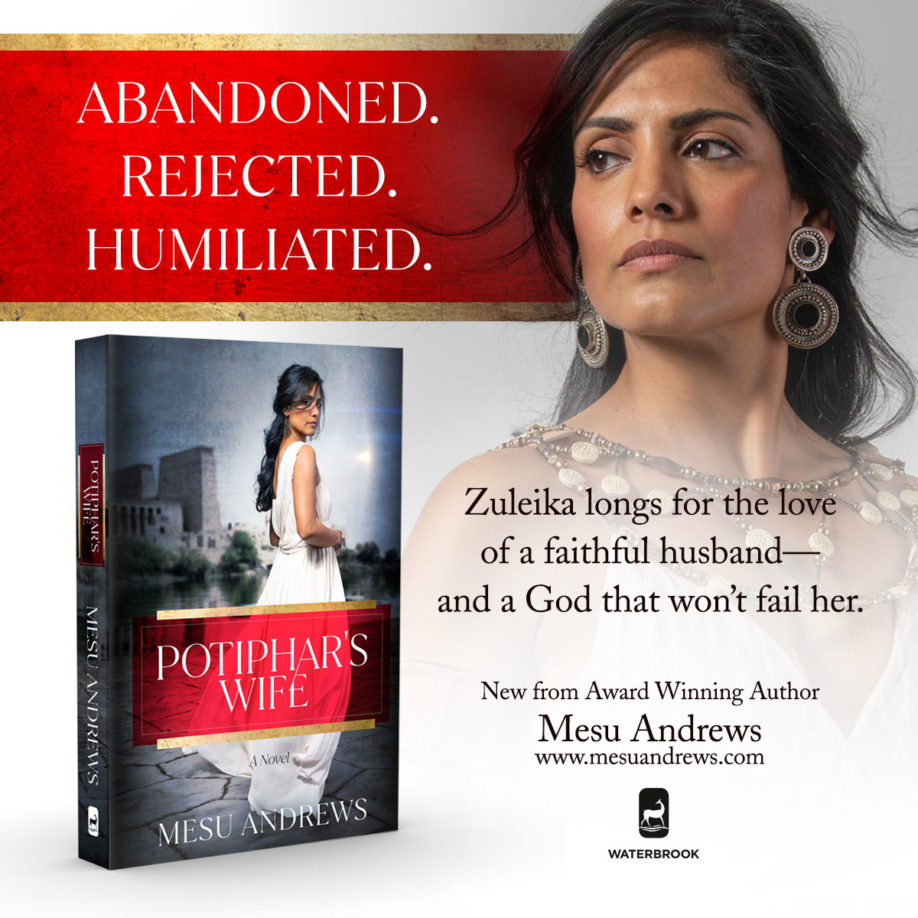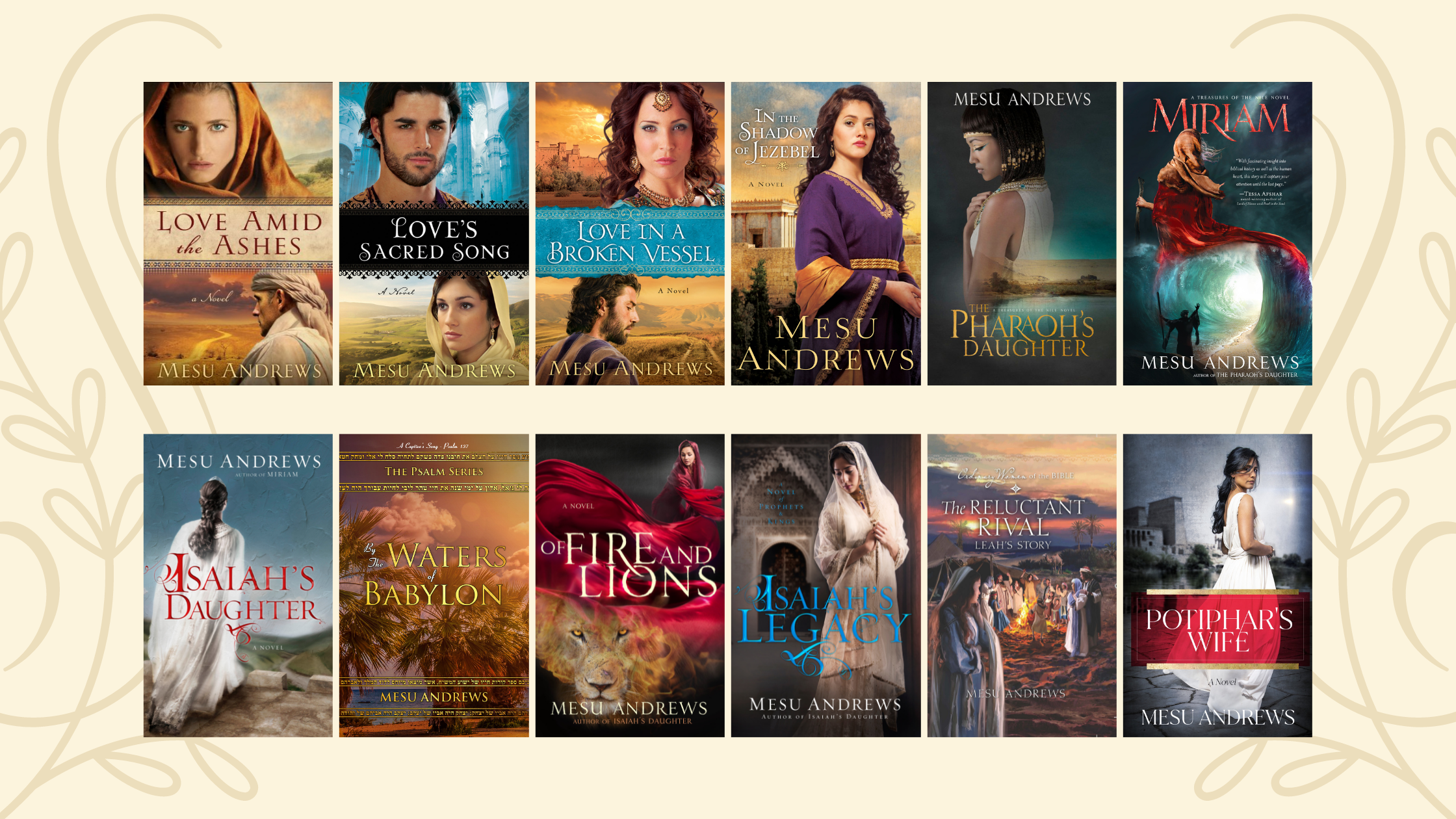 I’m going to tell you a secret–that probably won’t come as a surprise. I’ve never been drawn to “nice” girls. It was an issue when I chose friends as a kid. I liked my ornery classmates–maybe because I was a little spicy myself.
I’m going to tell you a secret–that probably won’t come as a surprise. I’ve never been drawn to “nice” girls. It was an issue when I chose friends as a kid. I liked my ornery classmates–maybe because I was a little spicy myself.
I wasn’t really a “bad girl”–per se. Well, not until later. But Jesus let me crash into a dead-end during my sophomore year of college and then saved me from a spiral. Now, I’m a child of the King, still a little spicy, and still like people, books, and movies with some pizzazz, passion, and redemptive POW!
That tendency toward intrigue and excitement means my biblical novels gravitate toward tough characters:
- Dinah: She was Jacob’s daughter who was raped in Shechem (Gen. 34). See my Love Amid the Ashes page for more details.
- Solomon’s unnamed shepherdess: She was Solomon’s “true love” in the Song of Songs. Where did she fit among his 700 wives and 300 concubines? See my Love’s Sacred Song page for more details.
- Gomer: She was a prostitute, wife of Hosea the prophet, because God told him to live in a broken marriage that represented God’s broken heart over Israel’s adultery with idols. See my Love in a Broken Vessel page for more details.
- Queen Athaliah of Judah: She was the daughter of Queen Jezebel of Israel, who brought Baal worship into the Temple of Jerusalem. She also killed all but one of David’s descendants (her grandchildren, BTW). See my In the Shadow of Jezebel page for more details.
- And the list continues…
To see my other books about Pharaoh’s daughter, Miriam, Isaiah’s Daughter, King Manasseh’s wife, Daniel’s (fictional) wife, and my upcoming release–Potiphar’s Wife–CLICK HERE. Or you can download a list of all my books HERE.
Stories That Need Telling
Why do I choose these difficult stories to tell? (Believe me, my editors ask the same question!) It’s because God included these bad girls’ stories (or implied existence) in His eternal record, so I believe He intended us to learn something from them. I’ve never written for sheer entertainment–always for edu-tainment.
However, there are always challenges, risks, and rewards inherent in the research and writing of a bad girl. After writing thirteen full-length novels, I think I’ve finally pinpointed some important truths about writing redemptive stories for these bad-to-the-bone biblical ladies. Here are a few thoughts on how the Bible’s bad girls teach us a thing or two despite their sometimes unsavory stories.
The Challenges of Writing a Bad Girl
The biggest challenge of writing bad girls is to represent them truthfully but make them palatable enough that YOU, the reader, are compelled to keep turning 400 pages to find redemption at the end?
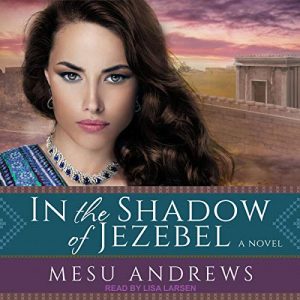 As I’ve said many times, I’ll never change the Truth of Scripture. We couldn’t change the terrible things Queen Athaliah did to the nation of Judah or to her own grandsons. Nor could I ignore the fact that Potiphar’s wife repeatedly propositioned Joseph and then unjustly accused him of attempted rape when he rejected her.
As I’ve said many times, I’ll never change the Truth of Scripture. We couldn’t change the terrible things Queen Athaliah did to the nation of Judah or to her own grandsons. Nor could I ignore the fact that Potiphar’s wife repeatedly propositioned Joseph and then unjustly accused him of attempted rape when he rejected her.
How does biblical FICTION make women with so little moral capital into a PALATABLE main character readers will tolerate?
We make them sympathetic. Of course, we hate all that Queen Athaliah did to Judah and to David’s descendants. With a mother like Jezebel, how could she be anything but twisted? In that book, we have a foil character–Jehosheba, Queen Athaliah’s step-daughter–who married Yahweh’s high priest and saves one of David’s descendants in the Temple for six years. She and her husband show how loving-kindness can heal even the deepest emotional wounds–and keep a spark of light burning in the darkest night.
“But Jehosheba, the daughter of King Jehoram and sister of Ahaziah, took Joash son of Ahaziah and stole him away from among the royal princes, who were about to be murdered . . . He remained hidden with his nurse at the temple of the Lord for six years while Athaliah ruled the land.” 2 Kings 11:2–3
Risks of Writing a Bad Girl’s Story
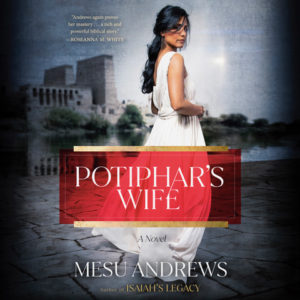 Bad girls become bad girls for a reason. Violence, injustice, and betrayal came to earth soon after Adam and Eve left the Garden of Eden and have injured us all at some point in our lives. In biblical times, women faced challenges to which modern women can’t relate; however, some scars in today’s women and biblical bad girls are created by the very same sins.
Bad girls become bad girls for a reason. Violence, injustice, and betrayal came to earth soon after Adam and Eve left the Garden of Eden and have injured us all at some point in our lives. In biblical times, women faced challenges to which modern women can’t relate; however, some scars in today’s women and biblical bad girls are created by the very same sins.
In Potiphar’s Wife, the main character–Zuleika, nicknamed Zully–faces feelings of abandonment as well as physical and emotional abuse when she arrives in Egypt. Later, she experiences sexual assault.
It’s not graphic or violent, but it’s a risk to include abuse, slavery, rape, prejudice, or any topic that could be considered controversial in a today’s highly sensitized climate.
So Why Take the Risk?
I started out writing safe little Bible studies that didn’t get into all this emotional stuff! It’s tempting to shy away from the reality of ancient culture or write stories with no real emotional conflict. But it would betray my own heart to do it. I never intend to glorify evil. What I hope to do is reveal enough of the darkness that God’s miraculous light can’t be denied!
While writing Potiphar’s Wife, I needed to realistically portray a woman completely devoid of conscience. How could she betray one of the Bible’s greatest heroes? She had to be desperate; and you, the reader, needed to empathize with her to believe she’d do the unthinkable. Only when we believe a character is beyond any earthly solution can we truly appreciate God’s miraculous salvation.
That’s when the risk is worth the reward…
Rewards of Writing a Bad Girl’s Story
The rewards of writing biblical novels are many. I LOVE digging into God’s Word and the personal lessons I learn there. I’ve always joked that writing books only gives me an excuse for my research habit!
But the true rewards come in responses from readers when the Lord speaks to them through my simple words. Here’s a portion of an email after a woman listened to the audio version of In the Shadow of Jezebel (ITSOJ):
“My life has many struggles, as does everyone, and your book helped my past week tremendously . . . Its helped my patience with confused elderly parents & uncle ( i use ear buds & continuously listen) I’ve even discussed thoughts & chapter themes with my son.”
Light From My “Darkest” Novel:
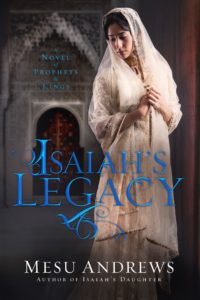 Here’s another encouraging note from a reader about Isaiah’s Legacy, the story of King Manasseh, Judah’s wickedest king:
Here’s another encouraging note from a reader about Isaiah’s Legacy, the story of King Manasseh, Judah’s wickedest king:
“I wanted to write and express how deeply your book Isaiah’s Legacy touched me. I have been a Christian for 43 years, grew up in the home of a Baptist pastor and consider myself to be a growing Christian. The past few years there has been some turmoil in our family that has driven me to my knees. I feel like I’m learning things I should have learned a long time ago. I’ve been realizing how superficial my faith has been, only surface level, faith for circumstances etc. Meanwhile God has been after my heart all along. Your book really embodied the work of God in our hearts. He’s not there to make all the circumstances work out right. He is consistently drawing us to Him. While I may never have worshipped the starry host, my faith needed to be anchored deeper than my circumstances. I didn’t read any truths I didn’t already know, but I read a lot that I needed reminded of. When I got done reading that book, I just wept before the Lord and worshipped Him for His holiness, sovereignty and love, His very personal love that never lets us go! I’m so thankful for His pursuit of my heart and your book played an important role in bringing my heart to a more tender place.”
These are the rewards that make the not-so-encouraging emails and private messages easier. I keep them in a special file and let the Lord’s grace flow over and through me on hard days.
Today’s Questions:
- Which of my books was hardest for you to read and why?
- Which of my books held the greatest reward for you (shined God’s light brightest) and why?

